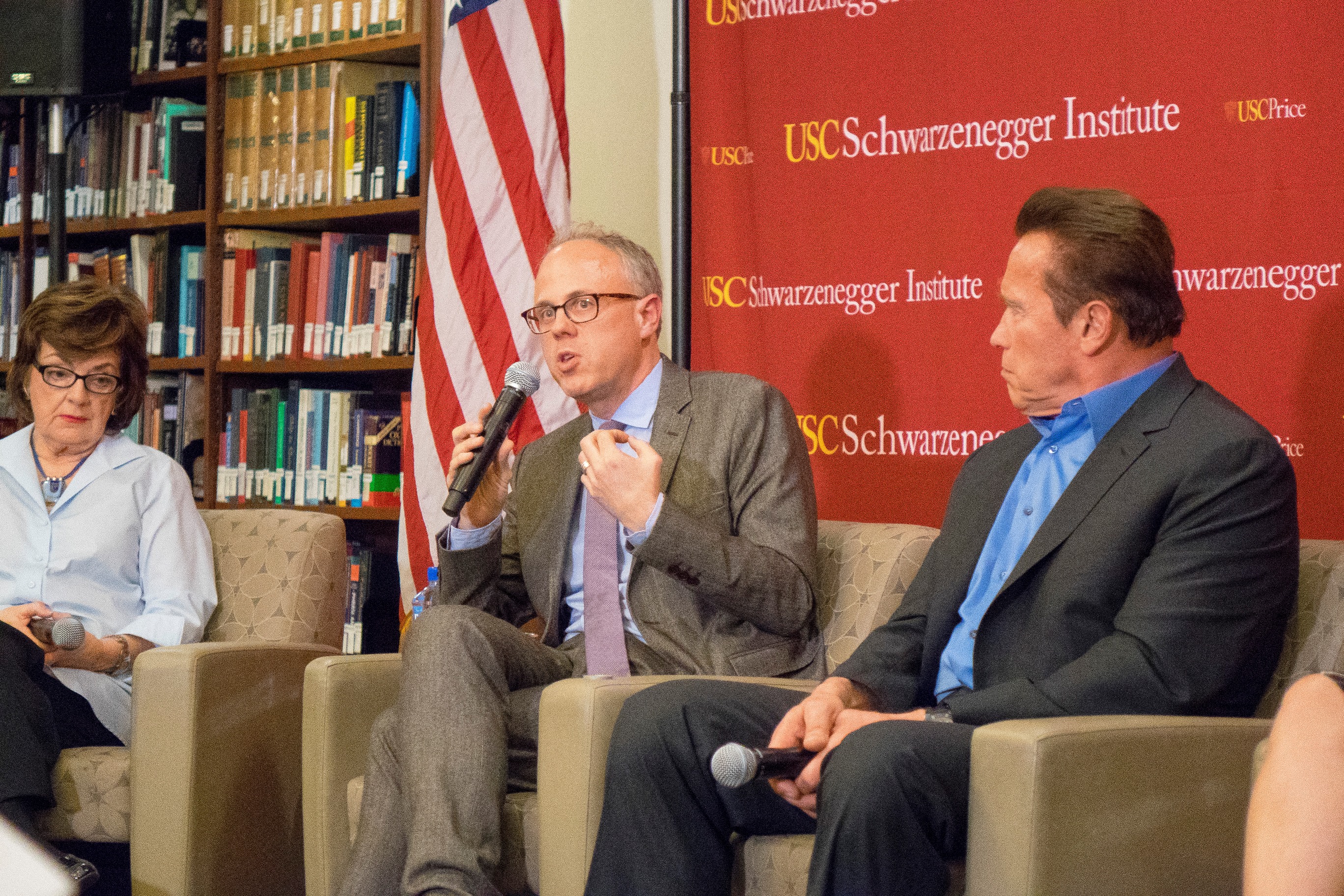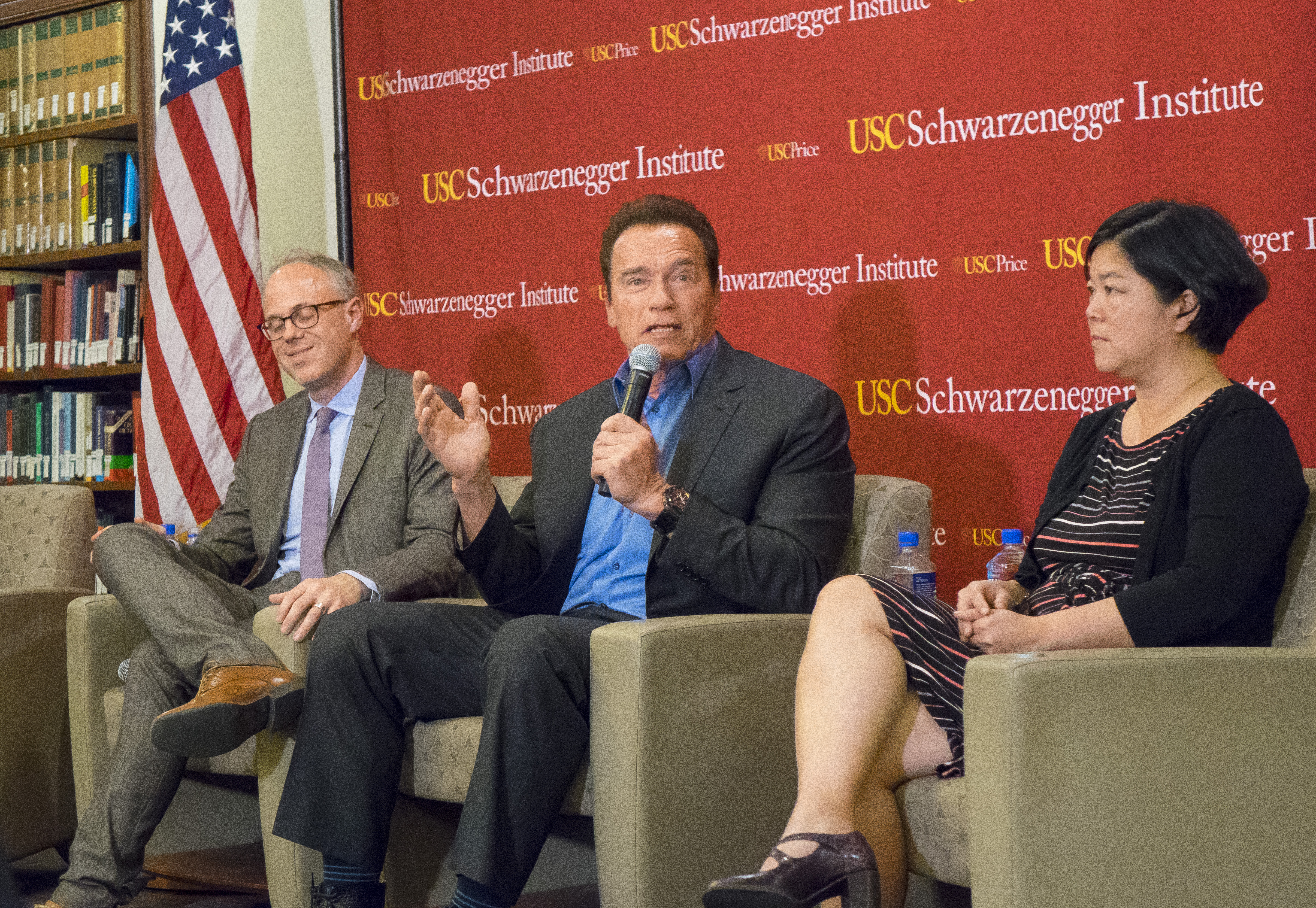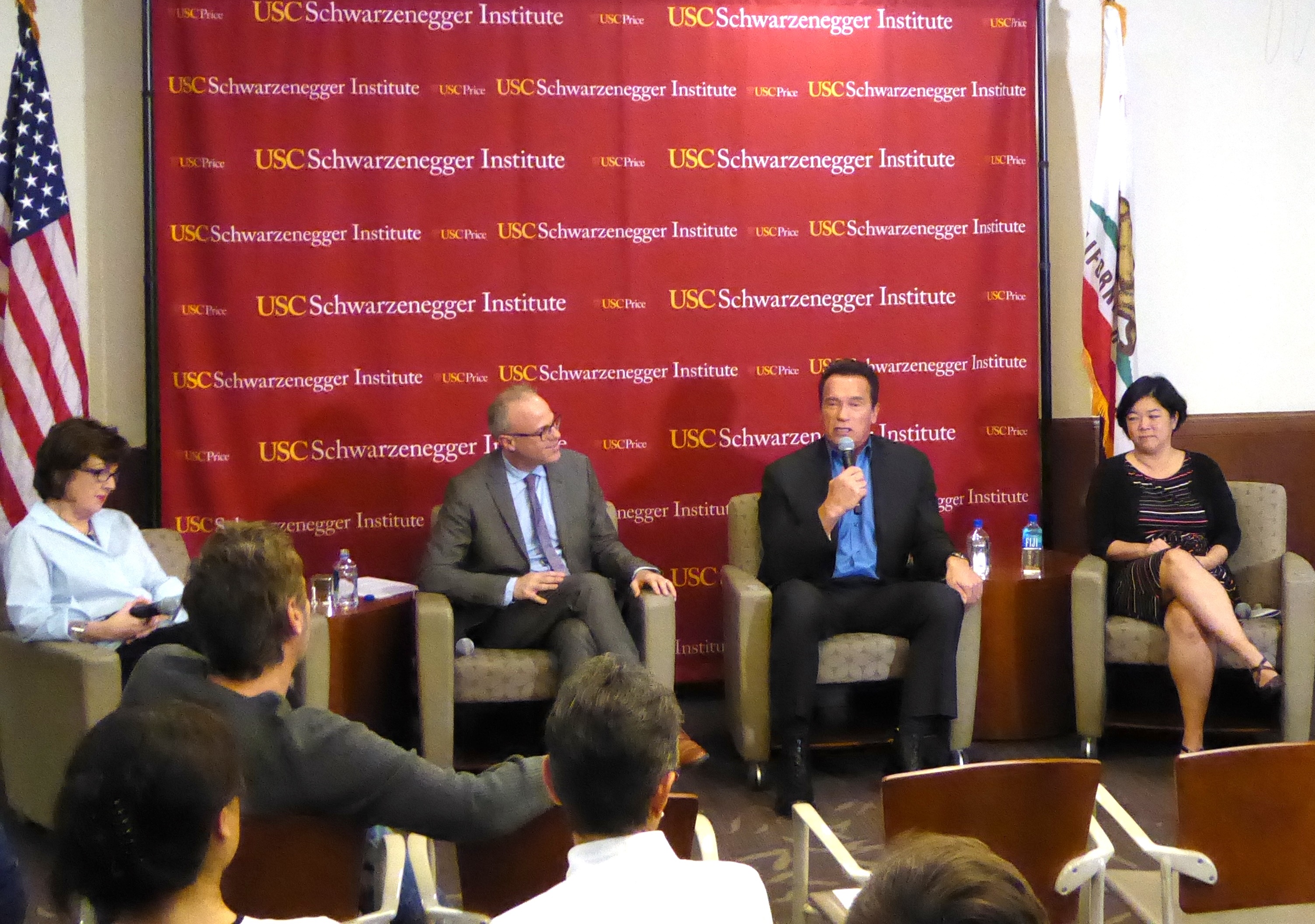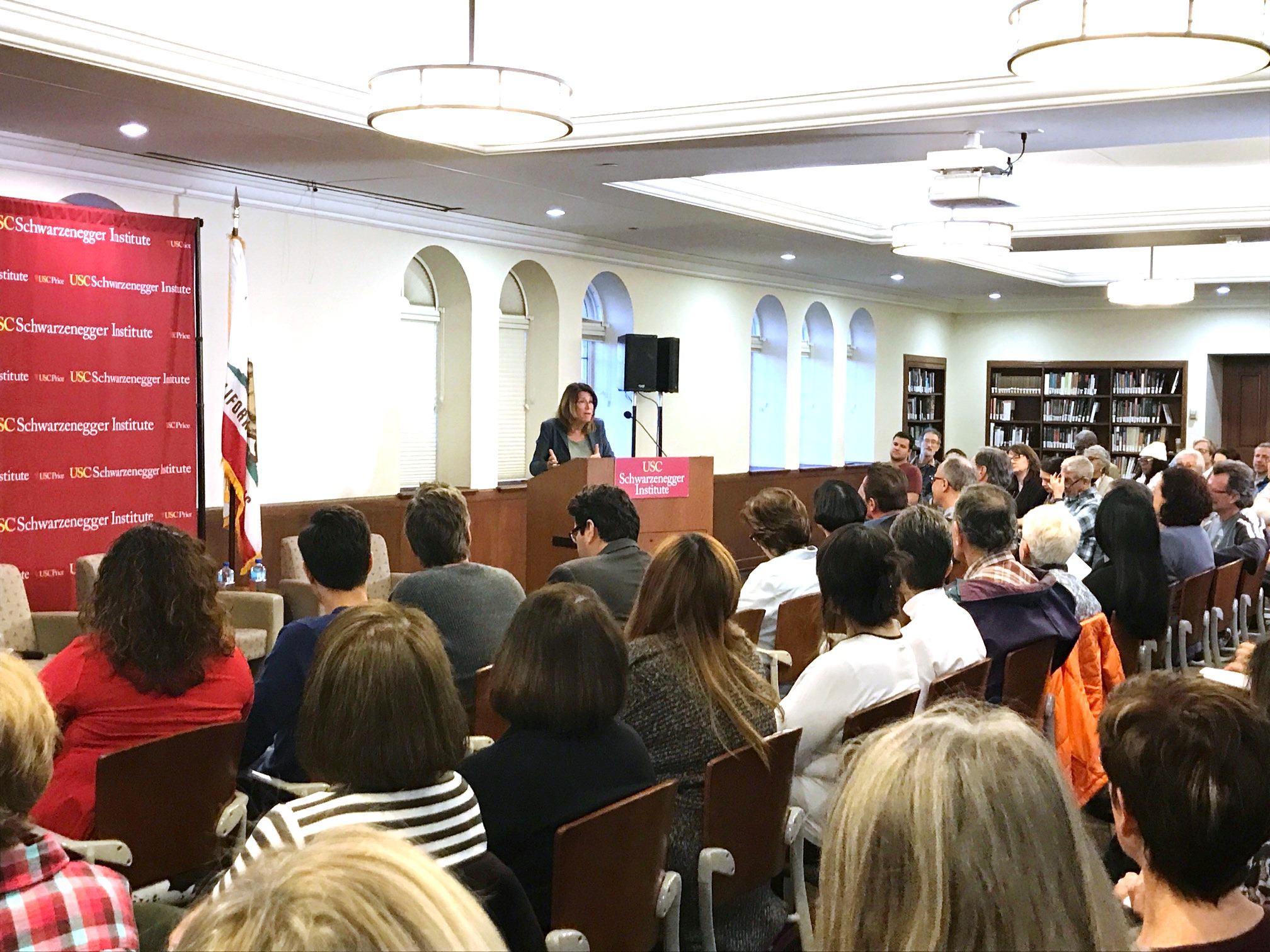David Daley, best-selling author and the former editor-in-chief of Salon, joined Governor Schwarzenegger, the USC Schwarzenegger Institute, Common Cause and the League of Women Voters on January 31st to talk about his new book Ratf**ked: The True Story Behind the Secret Plan to Steal America's Democracy. The informative discussion took place in the USC’s Doheny Library with a packed house and was viewed by 6,000 others through a live webcast on Governor Schwarzenegger’s Facebook page.
In opening the session, Institute Global Director Bonnie Reiss said that the reason Governor Schwarzenegger and the Institute have focused on political reform and redistricting is because of their belief that democracy is best served when the system is fair and when the voters select their political leaders, not when the political leaders select their voters.
Reiss explained that the Institute, in partnership with advocacy groups, continues to help support political reform efforts across the nation. She went on to discuss how many reformers look to the citizen redistricting initiative Governor Schwarzenegger supported in 2010, and which passed with over 61% of the vote, as an example of how to approach fair redistricting. In addition to supporting citizens like those in Arizona who passed their own redistricting reform, and supporting of the legal defense of the initiative, the Institute has supported the research of USC Professor Grose and his research partners looking at the impact of redistricting reforms as well as comparing the impact of open vs closed primaries.
In his prepared remarks and in a subsequent panel conversation Daley discussed the focus of his book, Project REDMAP, a calculated strategy led by Chris Jankowski, Director of the Republican Senate Leadership Committee with support from Carl Rove and other Republican operatives, which used gerrymandering to turn many U.S. House of Representative seats from competitive to safe Republican, and thus beginning to erode the foundation of American democracy.
Daley, referencing the historic tradition of politicians redrawing district lines, acknowledged that gerrymandering is not a new phenomenon but explained that recent developments in micro-targeting and computer aided mapping techniques, combined with an infusion of money from partisan Super PACs made possible by the Citizen United decision, created an environment where gerrymandering has achieved a level of sophistication and extremity never seen before.
He explained that Project REDMAP raised $30 million which was used in targeted state races to flip the majorities in 16 state legislatures from Democrat to Republican, thereby giving Republicans control of who draws the district lines following the 2010 census. The project succeeded in pushing 20 U.S. congressional districts from competitive to safely Republican.
As a result congressional and legislative districts in a number of states are being "packed" and "cracked" ruthlessly. Packing is when the party in charge of redistricting attempts to pack as many voters from the rival party into as few districts as possible thereby reducing the number of seats the opposition party can win. Cracking is when groups of opposition voters are spread out among several districts thereby limiting their strength as a voting bloc. New micro-targeting computer programs, like “Maptitude” were able to do a block by block analysis with data on each voter to gerrymander the targeted states.
Daley used the perennial swing state of Pennsylvania to illustrate this point. In 2008 (before Project REDMAP) the Democrats held 12 of the state's 19 congressional seats. After the 2010 mid-term elections the Republicans reversed these numbers winning 12 of 19 seats as well as majority control of the state legislature and the power to redraw the state's congressional lines. In 2012, once the gerrymander was complete, the Republicans won 13 of Pennsylvania's congressional seats to the Democrats 5 despite receiving 100,000 fewer voters than their Democrat rivals. "Packing" and "cracking" clearly contributed to the Republicans winning their 13 seats with an average 54 percent of the vote while the Democrats won their 5 seats with an average 76 percent of the vote.
Daley went on to explain how the Republicans achieved similar successes in five other states – North Carolina, Michigan, Ohio, Florida and Wisconsin – all but guaranteeing their control of the House of Representatives until 2022 when congressional lines are next redrawn.
Following his prepared remarks Daley sat down with Governor Schwarzenegger, Chis Carson from the League of Women Voters, Kathay Feng from Common Cause and Institute Director Bonnie Reiss to provide an overview of the state of redistricting in America, including which states have already passed reforms, which were being legally challenged, and which states were looking at similar reforms.
Chris Carson and Kathay Feng discussed the different approaches to redistricting, some more impactful to end gerrymandering than others. They highlighted a few states that have had success in decreasing gerrymandering like Iowa and Arizona and states like Ohio and Wisconsin which have the most viable efforts currently underway.
They also outlined a few of the landmark legal and reform efforts underway in different states across the country. The courts have been used to try to both stop citizen redistricting (e.g. Arizona) and also by good government groups trying to reverse gerrymandering.
Feng discussed the different legal theories used by reformers to strike down gerrymandered maps. She explained that unless plaintiffs can prove that a “constitutionally protected group” (e.g. racial group) was being negatively impacted their cases have been largely unsuccessful. She was encouraged however by the legal case examining Wisconsin's 2011 redistricting efforts and the potential legal precedent it might set. This case centers on how the gerrymander was done to deliberately disadvantage Democratic Party voters in the state, a theory that was previously unsuccessful at the Supreme Court, but with Justice Kennedy indicating that if some mathematical formula existed to prove this he would consider it in a future case. The plaintiffs in the Wisconsin case are using a mathematical formula (the Efficiency Gap) to prove deliberate and extreme redistricting that disenfranchise Democrat voters in the state and will soon be presenting their argument to the U.S. Supreme Court. Two other states are using similar legal approaches and Feng estimates that they will probably be heard by the Supreme Court in 2017-2018.
Governor Schwarzenegger in turn referenced his experience leading the State of California. He said that it quickly became apparent to him that gerrymandering resulted in a complete lack of accountability, and that in a 10 year period with over 500 elections, only one incumbent ever lost his seat. In the case of California both Democrats and Republicans were happy with the gerrymandered districts which protected all their seats and thereby caused each party to oppose citizen redistricting efforts. Schwarzenegger’s leadership motto was people over party so supporting political reforms that were based on fairness and putting the interests of voters first appealed to him.
Bonnie Reiss closed the program by thanking David Daley for his book and the other panelists for their insights and their work to advance good government. Reiss explained that the Schwarzenegger Institute is heavily focused supporting public policy aimed at improving politics in America and that it will continue to work with organizations like Common Cause and the League of Women Voters as well as with academics and journalists like David Daley to advocate for free and fair elections that prioritize people over politics.
In response to audience questions, many expressing great concern about the current state of our democracy, Schwarzenegger using his trademark optimism reminded everyone how many difficult times America has come through during its history and how the spirit of the American people has always come through crisis and difficulty stronger for it. Schwarzenegger closed by reminding the audience that democracy is not a spectator sport and that everyone needs to stay active and engaged.
Watch Highlights or the Full Program




